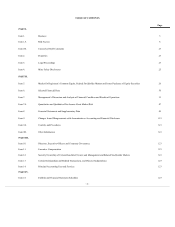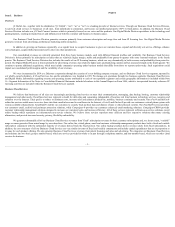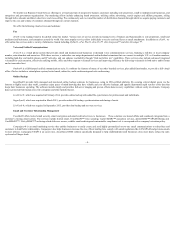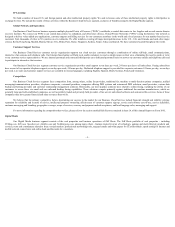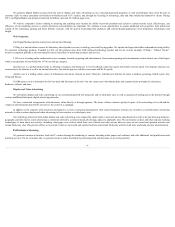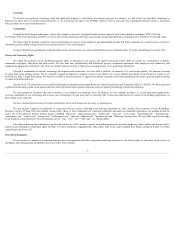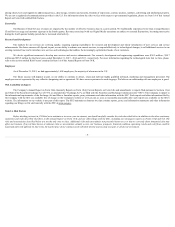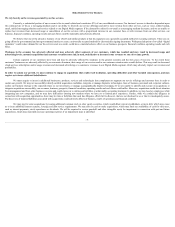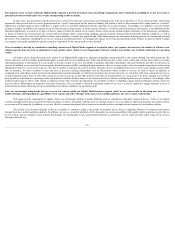eFax 2015 Annual Report Download - page 13
Download and view the complete annual report
Please find page 13 of the 2015 eFax annual report below. You can navigate through the pages in the report by either clicking on the pages listed below, or by using the keyword search tool below to find specific information within the annual report.
A system failure, security breach or other technological risk could delay or interrupt service to our customers, harm our reputation or subject us to significant liability.
Our operations are dependent on our network being free from interruption by damage from fire, earthquake, power loss, telecommunications failure, unauthorized entry,
computer viruses, cyber-attacks or any other events beyond our control. There can be no assurance that our existing and planned precautions of backup systems, regular data backups,
security protocols and other procedures will be adequate to prevent significant damage, system failure or data loss. Also, many of our services are web-based, and the amount of data
we store for our users on our servers has been increasing. Despite the implementation of security measures, our infrastructure may be vulnerable to computer viruses, hackers or
similar disruptive problems caused by our subscribers, employees or other Internet users who attempt to invade public and private data networks. As seen in the industries in which
we operate and others, these activities have been, and will continue to be, subject to continually evolving cybersecurity and technological risks. Further, in some cases we do not have
in place disaster recovery facilities for certain ancillary services. Moreover, a significant portion of our operations relies heavily on the secure processing, storage and transmission of
confidential and other sensitive data. For example, a significant number of our cloud services customers authorize us to bill their credit or debit card accounts directly for all
transaction fees charged by us. We rely on encryption and authentication technology to effect secure transmission of confidential information, including customer credit and debit
card numbers. Advances in computer capabilities, new discoveries in the field of cryptography or other developments may result in a compromise or breach of the technology used
by us to protect transaction and other confidential data. Any system failure or security breach that causes interruptions or data loss in our operations or in the computer systems of our
customers or leads to the misappropriation of our or our customers' confidential information could result in a significant liability to us (including in the form of judicial decisions
and/or settlements, regulatory findings and/or forfeitures, and other means), cause considerable harm to us and our reputation (including requiring notification to customers,
regulators, and/or the media) and deter current and potential customers from using our services. Any of these events could have a material adverse effect on our business, prospects,
financial condition, operating results and cash flows.
Increased numbers of credit and debit card declines in our cloud business could lead to a decrease in our cloud business revenues or rate of revenue growth.
A significant number of our paid cloud services subscribers pay for their services through credit and debit cards. Weakness in certain segments of the credit markets and in
the U.S. and global economies could result in increased numbers of rejected credit and debit card payments. We believe this could result in increased cloud services customer
cancellations and decreased customer signups. Rejected credit or debit card payments, cloud services customer cancellations and decreased customer sign up may adversely impact
our revenues and profitability.
If our Business Cloud Services segment experiences excessive fraudulent activity or cannot meet evolving credit card company merchant standards, we could incur
substantial costs and lose the right to accept credit cards for payment and our subscriber base could decrease significantly.
A significant number of our paid cloud services subscribers authorize us to bill their credit card accounts directly for all service fees charged by us. If people pay for these
services with stolen credit cards, we could incur substantial unreimbursed third-party vendor costs. We also incur losses from claims that the customer did not authorize the credit
card transaction to purchase our service. If the numbers of unauthorized credit card transactions become excessive, we could be assessed substantial fines for excess chargebacks and
could lose the right to accept credit cards for payment. In addition, we are subject to Payment Card Industry (“PCI”) data security standards, which require periodic audits by
independent third parties to assess our compliance. PCI standards are a comprehensive set of requirements for enhancing payment account data security. Failure to comply with the
security requirements or rectify a security issue may result in fines or a restriction on accepting payment cards. Credit card companies may change the standards required to utilize
their services from time to time. If we are unable to meet these new standards, we could be unable to accept credit cards. Further, the law relating to the liability of providers of
online payment services is currently unsettled and states may enact their own rule with which we may not comply. Substantial losses due to fraud or our inability to accept credit card
payments, which could cause our paid cloud services subscriber base to significantly decrease, could have a material adverse effect on our business, prospects, financial condition,
operating results and cash flows.
- 12 -


